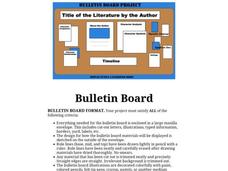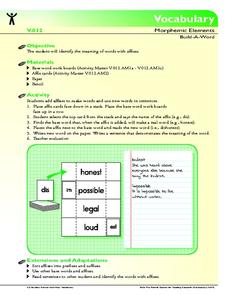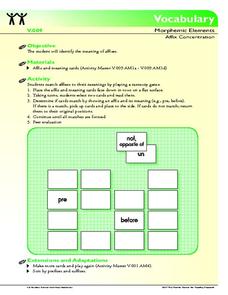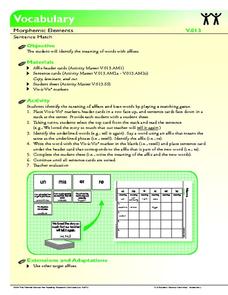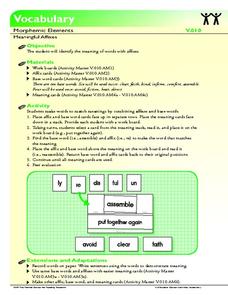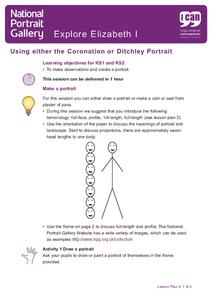Southwest Career and Technical Academy
Romeo and Juliet and West Side Story - Compare and Contrast
West Side Story, the modern retelling of William Shakespeare's Romeo and Juliet, won ten Academy Awards for its rousing depiction of the tale of star-crossed lovers. But how closely does the plot align to its source material? Compare and...
Simon & Schuster
Les Miserables Classroom Activities
Modern readers apply classic themes to Victor Hugo's masterpiece, Les Miserables. After they discuss tricky vocabulary and plot elements from the novel, class members compare Hugo's written work to a stage or film adaptation of the musical.
Curated OER
Compare and Contrast Photograph Art
Take a trip down Pearblossom Highway with this lesson about comparing and contrasting. Using David Hockney's Pearblossom Hwy and another image of the same highway (photograph or other image), students compare and contrast the two...
Teacherfiles
Character Grid
Characters are built with more than just what the author directly says about a character (ex: she is smart). Help your pupils focus on several elements of characterization with a graphic organizer that has space for two characters....
Florida Center for Reading Research
Vocabulary: Morphic Elements, Compound Word Trivia
Engage young learners in expanding their vocabulary with a fun game. Scholars learn how compound words provide clues about the meaning of unfamiliar vocabulary. Pairs take turns reading a definition, locating its corresponding compound...
Florida Center for Reading Research
Vocabulary: Morphemic Elements, Root-O!
Young readers get to the root of unfamiliar vocabulary with a collaborative learning activity. Given a deck of root word cards and copies of a graphic organizer, pairs of students take turns flipping over cards and brainstorming...
Sandra Effinger
Bulletin Board Project
Imagine a project that informs and entertains. Replace book reports with a bulletin board that highlights all the important elements of a novel. Readers research the author, create a timeline of events in the story, write a character...
Florida Center for Reading Research
Vocabulary: Morphemic Elements, Affix Match
Play a quick game of memory, but with a grammatical twist! Learners match the affixes to their meanings.
Florida Center for Reading Research
Vocabulary: Morphemic Elements: Affix Action
Make a game out of word parts. Pupils work in pairs to advance along the board. One partner reads a sentence from a card, and the other identifies the correct affix that fits with a word in that sentence.
Florida Center for Reading Research
Vocabulary: Morphemic Elements, Build-A-Word
An affix plus a base word equals what? A new word! Invite your class members to discover words using affixes and base words. Learners then write sentences using the real words that they put together.
Florida Center for Reading Research
Vocabulary: Morphemic Elements, Affix Concentration
Ask your class to concentrate their energy on affixes! Pupils match various affixes to their meanings in a memory-style game until all the cards have been gathered.
Florida Center for Reading Research
Vocabulary: Morphemic Elements, Sentence Match
Ask your class to puzzle out the meaning of various affixes. Learners read sentences and develop a new word with an affix to replace the underlined words. They write down the words and help to categorize them by affix.
Florida Center for Reading Research
Vocabulary: Morphemic Elements, Meaningful Affixes
Invite learners to determine which affix and base word combinations create new words. This activity allows pupils to play around and create words that match specific meanings.
Florida Center for Reading Research
Vocabulary Morphemic Elements: Word Dissect
Assist pupils as they learn to separate base words and affixes and combine them to determine the meaning of words. Partners practice with cards that include words with affixes.
Have Fun Teaching
Silly Stories
Young writers get a jump start on story telling by selecting a plot, a setting, and multiple character cards and then use these basic elements to create a tale.
Novelinks
The Little Prince: Concept/Vocab Analysis
Focus on the literary elements of Antoine de Saint-Exupéry's The Little Prince with a concept analysis sheet. With suggestions and explanations for many of the book's concepts, vocabulary, and other issues that may arise in instruction,...
Novelinks
The View From Saturday: Concept/Vocabulary Analysis
Design your unit on The View From Saturday by E.L. Konigsburg with a concept and vocabulary analysis resource. It outlines the plot, literary elements, vocabulary issues, and any possible considerations for planning a differentiated...
College Board
2009 AP® English Literature and Composition Free-Response Questions
Scholars select a novel or play and craft an essay to discuss what the symbol reveals about the characters or theme. Writers also analyze a passage and a poem to determine how the authors use literary elements to relay their messages.
Florida Center for Reading Research
Vocabulary: Morphemic Elements, Rooting for Meaning!
Scholars work with root and meaning cards to build vocabulary skills. Playing with a partner, learners read a root, locate its meaning, and cover it with a counter. The first player to cover their board wins.
EngageNY
What Makes a Myth a Myth? Comparing “Cronus” and “Shrouded in Myth”
Scholars complete a Venn diagram to compare and contrast Cronus and Shrouded in Myth. Learners work in their triads to write similarities and differences on sticky notes. They then take a look at the text The Key Elements of Mythology to...
Curated OER
Nellie Bly's Newspaper Club: Introducing the Art of Writing
Students use video and the Internet to research the life of Nellie Bly, a famous female reporter from the 19th century. They research a writer and present their information to the class in the style of a news reporter.
National Portrait Gallery (UK)
Explore Elizabeth I
Keen observation skills are an essential trait for good artists. Discuss the elements of a portrait with your class using terminology such as, full-face, profile, quarter-length, full-length. After that, they can use the included...
Hamilton Schools
Figurative Language
What's the difference between a simile and a metaphor? Show language arts learners a presentation that identifies different types of figurative language used in poetry.
Houghton Mifflin Harcourt
Family Time: Extra Support Lessons (Theme 5)
Provide extra support with a unit that follows a teach, blend, guided practice, and practice/apply routine to reinforce reading, grammar, vocabulary, and writing skills. Reading and writing lessons include supporting details, story...
Other popular searches
- Elements of Art Worksheets
- Art Elements
- Elementary Art Elements
- Art Elements Space
- Teaching Elements of Art
- Artistic Elements
- Art Elements of Design
- Five Elements of Art
- Elements of Art Value
- Art Elements and Principles
- Fundamental Elements of Art
- Elements of Art Line








